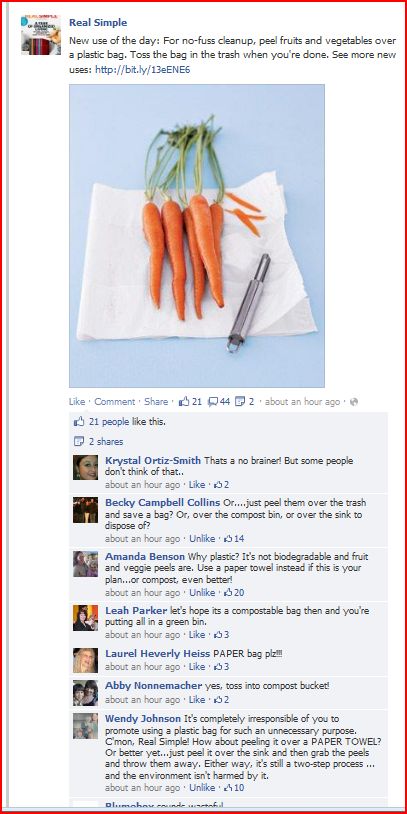There’s no real way to tell if Real Simple had any intention of posting this controversial topic as a way to increase engagement and therefore improve their Facebook edge rank or if it was just a post that wasn’t thought through, but it makes for an interesting question about engagement tactics.
Approximately one hour after posting this controversial tip Real Simple saw the following rapid fire engagement:
- 21 Likes
- 44 Comments, most of which call them out on environmentally irresponsible advice
- 2 shares
- Multiple likes on individual comments – up to 20 likes on the early comments
Real Simple has a stable of 266K followers, so it will be interesting to see how long the reactions go to this piece over the course of the day and week. Other recent tips and shares by Real Simple in the last month averaged 10 comments or less total once they’d been posted and anywhere from 23-300 likes and 15-150 shares without generating much commenting engagement.
The question is – does it make sense to stir controversy to build engagement? And are you putting your brand at risk by doing so?
In Real Simple’s case I’d rate this as a small faux pas only since Real Simple does focus on a lot of green living and eco-friendly advice, but it’s not their core business. At their core they’re about saving time and keeping things easy so they didn’t stray from their principles with this post, though it gave them a great barometer of how their audience feels about recycling & composting.
The other great thing about stirring up controversy is that it offers you a gold mine of opportunities for new topic ideas that legitimately engage your audience. If you blog or continue a post thread that can be invaluable. Right now Real Simple should be planning articles all about composting, best composting tools, cheap composting tools & methods, using vegetable waste for compost, alternate uses for vegetable waste like backyard chickens, making homemade vegetable stock, supplementing pet diets… This is some of my favorite data to work with.
So what do you think? Was this a mistake or a tactic, and is it a good one or is it dangerous ground?


